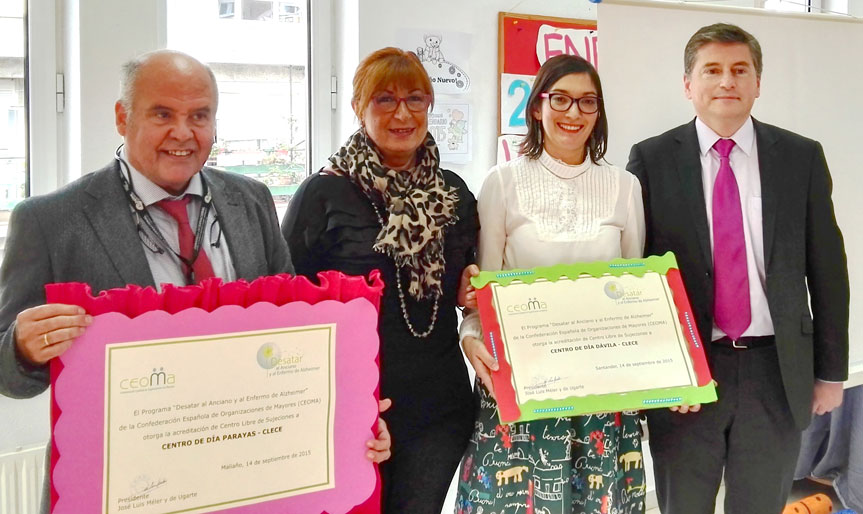
Two day centres for the elderly managed by Clece are certified “Constraint-free”
- The certification is for the non-use of physical and pharmacological constraints when tending to and caring for elderly people and Alzheimer’s sufferers
- Only four day centres in Spain have been granted this recognition
Santander, 22 January 2016. The Parayas day centre in Camargo and the General Dávila day centre in Santander were awarded “Constraint-Free Centre” accreditation this morning from the Spanish Confederation of Organisations for the Elderly (CEOMA). Both centres belong to the network of day centres run by the Social Services Institute of Cantabria, ICASS, and are managed by Clece.
Isabel Lebrero, the director of the centres, received the accreditation from Dr Antonio Andrés Burgueño, the director of the programme “Untie the elderly and Alzheimer’s sufferers” since its creation in 2003. The event was also attended by Felisa Lois, ICASS director; Miguel Ángel Cavia, ICASS dependency deputy director; María Antonia Astuy; head of Community Resources at ICASS; José Manuel Millán, social services manager at Clece; and two representatives from the Cantabria Nursing College, Pilar Elena Sinobas and Rocío Cardeñoso.
The Parayas and General Dávila day centres now join the small group of care homes and centres for the elderly across the country that have been awarded this prestigious certification. According to the CEOMA register of accredited centres, only 24 care homes and two day centres currently have the certification. The recognition is for not using any physical or pharmacological constraints when tending to and caring for elderly people and Alzheimer’s sufferers.
Isabel Lebrero expressed her gratitude for “everyone’s involvement and the great teamwork undertaken to secure this certification. It puts us at the forefront of the transformation that geriatric care is undergoing, where one of the major advances is precisely the evolution towards care without the use of constraints to improve the wellbeing and quality of life for elderly people and their families”. As an exemplary experience and a model to follow, Isabel Lebrero spoke of Trieste in Italy, which has become a “constraint-free city”, from where Fabio Cimador, who was behind the initiative, sent his congratulations for the recently accredited centres. Lebrero the message sent by Cimador, who stressed the “serious harm” that the use of constraints can cause, despite it being such a widespread practice.
Dr Antonio Andrés Burgueño congratulated the centres “for joining a more human and ethical model despite the effort involved, as it requires a change in the working culture of professionals, the attitudes of families, a great deal of training and a range of environmental, organisational and equipment changes to ensure a safe environment”.
Constraints have been used to prevent risk situations in certain types of patients. The evolution in geriatric care has shown its use to go against the objectives of prolonged care for the elderly. Among other problems, it can lead to pressure sores, incontinence, muscular atrophy and behavioural disorders. It is these aspects that have led to the change in strategy towards a constraint-free model of care.
In the photo: Antonio Andrés Burgueño, director of the “Untie the elderly and Alzheimer’s sufferers” programme; Felisa Lois, ICASS director; Isabel Lebrero, director of the Parayas and General Dávila day centres; and José Manuel Millán, social service manager at Clece.
